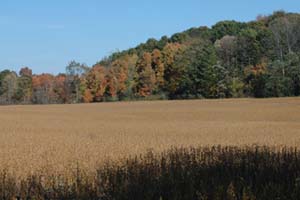|
Since 1988, the Southeast Michigan Land Conservancy has helped preserve approximately 3,400 acres in southeast Michigan. This has been accomplished through:
- land donations
- conservation easements
- outright purchase of land in cases with especially high conservation value
SMLC has, at times, assisted local governments and other agencies with their land protection efforts.
Properties SMLC may consider for conservation could be good quality natural habitats, wetlands, farm land, or even urban parks and natural areas. If you are thinking about preserving your property, there are several conservation methods to be aware of. Preserving your land, in certain situations, could potentially provide property tax relief as well as additional state and federal tax benefits.
If you know of a property in the 7-county southeast Michigan region (Livingston, Macomb, Monroe, Oakland, St. Clair, Washtenaw, Wayne) which is worthy of protection please contact SMLC.
For more information about protecting your land, contact:
Land Donation
(from https://landtrustalliance.org/take-action/conserve-your-land/how-to-conserve-your-land)
 Donating land for conservation purposes is truly one of the finest legacies a person can leave to future generations. It may be the best conservation strategy for you if you do not wish to pass the land on to heirs; own property you no longer use; own highly appreciated property; have substantial real estate holdings and wish to reduce estate tax burdens; or would like to be relieved of the responsibility of managing and caring for land. Donating land for conservation purposes is truly one of the finest legacies a person can leave to future generations. It may be the best conservation strategy for you if you do not wish to pass the land on to heirs; own property you no longer use; own highly appreciated property; have substantial real estate holdings and wish to reduce estate tax burdens; or would like to be relieved of the responsibility of managing and caring for land.
Donating land releases you from the responsibility of managing the land and can provide substantial income tax deductions and estate tax benefits (while avoiding any capital gains taxes that would have resulted from selling the property). Most important, if the land is donated because of its conservation value, it will be protected. (Although our focus here is on conservation land, commercial and residential properties can also be donated to a land trust, with the understanding that the organization will sell the land to support its conservation work.)
Donating a remainder interest in land: An outright donation is not the only way to give land. You can continue to live on the land by donating a remainder interest and retaining a reserved life estate. In this arrangement, you donate the property during your lifetime, but continue to live on and use the property. When you die (or sooner if you choose), the land trust gains full title and control over the property.
By donating a remainder interest, you can continue to enjoy your land and may be eligible for an income tax deduction when the gift is made. The deduction is based on the fair market value of the donated property less the expected value of the reserved life estate.
Donating land by will: If you want to own and control your land during your lifetime, but assure its protection after your death, you can donate it by will. You should make sure the chosen recipient is willing and able to receive the gift.
Land donations that establish a life income: If you have land you would like to protect by donating it to a land trust, but need to receive income during your lifetime, you might use a charitable gift annuity. In a charitable gift annuity, you agree to transfer certain property to a charity, and the charity agrees to make regular annuity payments to one or two beneficiaries you specify for life.
Your gift of land usually qualifies for a charitable income tax deduction at the time of the gift, based on the value of the land less the expected value of the annuity payments.
Another option for donating property and receiving regular income is a charitable remainder unitrust. You place the land in a trust, first putting a conservation easement on it if it is to be protected. Then the trustee sells the land and invests the net proceeds from the sale. One or more beneficiaries you specify receive payments each year for a fixed term or for life, then the trustee turns the remaining funds in the trust over to the land trust.
The gift qualifies for a charitable income tax deduction when the land is put in the trust, based on the value of the land less the expected value of the payments.
Charitable gift annuities and charitable remainder unitrusts are most useful for highly appreciated land, the sale of which would incur high capital gains tax.
Land Conservation Easements
(from https://landtrustalliance.org/take-action/conserve-your-land/how-to-conserve-your-land)
 A conservation easement is a legal agreement between a landowner and a land trust or government agency that permanently limits uses of the land in order to protect its conservation values. It allows you to continue to own and use your land and to sell it or pass it on to heirs. A conservation easement is a legal agreement between a landowner and a land trust or government agency that permanently limits uses of the land in order to protect its conservation values. It allows you to continue to own and use your land and to sell it or pass it on to heirs.
When you donate a conservation easement to a land trust, you give up some of the rights associated with the land. For example, you might give up the right to build additional structures, while retaining the right to grow crops. Future owners also will be bound by the easement's terms. The land trust is responsible for making sure the easement's terms are followed.
Conservation easements offer great flexibility. An easement on property containing rare wildlife habitat might prohibit any development, for example, while one on a farm might allow continued farming and the building of additional agricultural structures. An easement may apply to just a portion of the property, and need not require public access.
A landowner sometimes sells a conservation easement, but usually easements are donated. If the donation benefits the public by permanently protecting important conservation resources and meets other federal tax code requirements--it can qualify as a tax-deductible charitable donation. The amount of the donation is the difference between the land's value with the easement and its value without the easement.
Placing an easement on your property may also result in property tax savings.
Perhaps most important, a conservation easement can be essential for passing land on to the next generation. By removing the land's development potential, the easement lowers its market value, which in turn lowers estate tax. Whether the easement is donated during life or by will, it can make a critical difference in the heirs' ability to keep the land intact.
Bargain Sale of Land
(from https://landtrustalliance.org/take-action/conserve-your-land/how-to-conserve-your-land)
If you need to realize some immediate income from selling your land, yet would like the property to go to a land trust, a bargain sale might be the answer. In a bargain sale, you sell the land to a land trust for less than its fair market value. This not only makes it more affordable for the land trust, but offers several benefits to you: it provides cash, avoids some capital gains tax, and entitles you to a charitable income tax deduction based on the difference between the land's fair market value and its sale price.
Landowner Testimonials
Dr. Joe & Julia Morris and Dr. Rudolph & Shirley Reichert
Unadilla Township, Livingston County, MI
242 Acres Preserved
Land Donation
"We felt a deep sense of obligation to protect some land and wildlife so that future generations wouldn’t be denied the tranquility of frequent contact with open spaces. That was our motive in making the donation to the Conservancy."
Bradford & Nancy Perkins
Superior Township, Washtenaw County, MI
30 Acres Preserved
Land Donation
"While the costs of the transaction were not inconsequential, the tax savings far outweighed them. We have the pleasure of knowing that our wilderness land will never be developed..."
Bill Secrest & Misty Callies
Superior Township, Washtenaw County, MI
20 Acres Preserved
Bargain Sale
"Several years ago, 20 acres across the road from our house went on the market. We took a gamble, borrowed some money, and we bought it. Seven years later, the market value doubled, and we sold the property to the Conservancy at half price. The difference between the market value and our "bargain sale" price constituted a significant tax break for us, so all of our expenses were covered, we have preserved the country ambience we love, and the acreage is now part of the Superior Green Belt instead of a housing development."
|

 Donating land for conservation purposes is truly one of the finest legacies a person can leave to future generations. It may be the best conservation strategy for you if you do not wish to pass the land on to heirs; own property you no longer use; own highly appreciated property; have substantial real estate holdings and wish to reduce estate tax burdens; or would like to be relieved of the responsibility of managing and caring for land.
Donating land for conservation purposes is truly one of the finest legacies a person can leave to future generations. It may be the best conservation strategy for you if you do not wish to pass the land on to heirs; own property you no longer use; own highly appreciated property; have substantial real estate holdings and wish to reduce estate tax burdens; or would like to be relieved of the responsibility of managing and caring for land. A conservation easement is a legal agreement between a landowner and a land trust or government agency that permanently limits uses of the land in order to protect its conservation values. It allows you to continue to own and use your land and to sell it or pass it on to heirs.
A conservation easement is a legal agreement between a landowner and a land trust or government agency that permanently limits uses of the land in order to protect its conservation values. It allows you to continue to own and use your land and to sell it or pass it on to heirs.